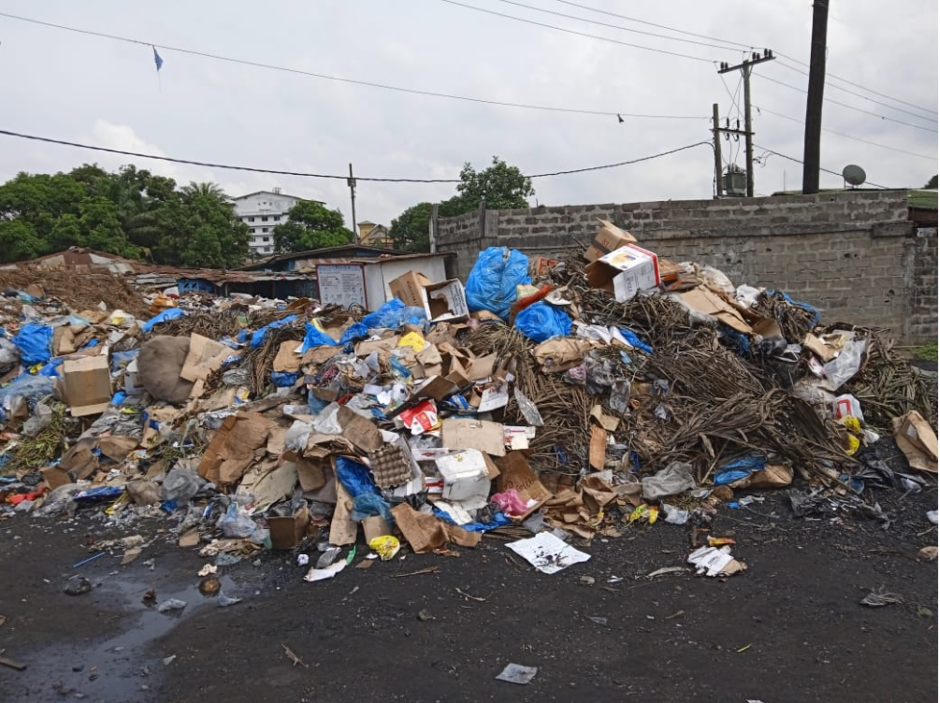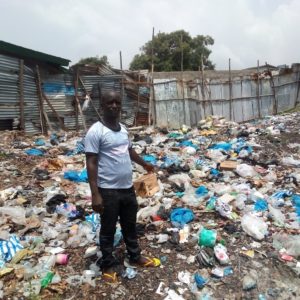
MONROVIA – Waste plastic is becoming a scourge around the world but it is especially true here in Liberia’s capital city and its satellite sister, Paynesville. Discarded plastic is choking waterways, blocking drains, killing fish, and leaching harmful chemicals into the water and soil.
By Tina S. Mehnpaine, with New Narratives
With poor or limited waste management systems, many communities in Monrovia and Paynesville are drowning in plastic. Many are forced to burn or bury their garbage adding to the health problems created by plastic pollution itself. Plastics constitute 14.2 percent of Monrovia’s waste, according to Research Gate, a Germany-based network of scientists and researchers.
‘’Plastic pollution in Liberia is bad. People throw plastics everywhere. They stay in the environment for 100 years. Plastic must be contained and recycled,’’ said. Dr. Eugene Shannon, former Minister of Mines and Energy, now President of the Natural Resources Development Corporation.
Health problems are the biggest concern for those who live with the plague of plastic.
“After constant inhaling of smoke from the burned waste, I was diagnosed with asthma three years ago. Since then I have been battling with the illness,” says Yatta Kollie, who lives with her three children near a dumpsite in Buzzy Quarter, a slum community in Monrovia.
When burned, buried, or consumed, plastics can lead to an array of sicknesses, including heart, lungs, and nerve problems. The smoke from the plastic burned releases black carbon into the atmosphere which contributes to climate change.
The health costs of burning plastic need to be addressed quickly by policymakers according to Dr. Lyndon G. Mabande, Registrar General at the Liberia Medical and Dental Council.
“Imagine you are in a car, some garbage is being burned, your first experience is to inhale the terrible smoke,” said Dr. Mabande. “What comes out of the smoke has certain chemicals. These chemicals are very dangerous to the lung. You think you are inhaling oxygen but in truth, you are inhaling black carbon that will affect your lungs.”
Dr. Mabande said no research had been done on the impacts of garbage burning on Liberians’ health. Health experts are forced to rely on research carried out elsewhere but Dr. Mabande has no doubt, “the effect on us is more.’’
Burning plastic has been a particularly bad problem for the slum community of Soinwein in Monrovia, which has long complained that the Monrovia City Corporation (MCC) has been slow to collect garbage dumped here by other communities. Garbage spreads across the road leading to Center Street in Soinwein attracting flies, cockroaches and rat. Residents live with a toxic odor in the air.
Residents here burn the waste to reduce the odor which makes life miserable for them according to Michael Welsey-Johnson, chairman of the Soinwein.

Microplastics contaminate food chains through the soil and water harming crops. They also have a devastating effect on marine life. Sea birds, whales, fish, and turtles can mistake plastic waste for prey, dying from suffocation and entanglement while others die of starvation as their stomachs fill with plastic. A 2016 report by the World Economic Forum says by 2050, there will be more plastics in the oceans than fish if the current trend of plastic pollution is not reversed.
Liberia’s fishermen are already seeing a more direct impact. Where once they filled their nets with fish, now fish are crowded out.
“When you throw your net, instead of catching fish, you will grab plastics,” said Abraham Zinnah, a fisherman in West Point. “When the net is full with plastics, you won’t be able to pull it back in the canoe, and if you are not careful, the canoe will capsize and you will die in the process.”
“When people go to look for their daily bread all day, all of them will bring plastics instead of fish,” said Theresa Siah Bayon, General Secretary of the Liberia Artisanal Fishermen Association. “In 2019 we had a project with the Ireland embassy in Monrovia. They gave us a contract to pay US$90 to people living along the beaches to pick up the plastics, but the project ended and these people have not been able to continue cleaning the beaches so as a result, the beaches are filthy with garbage.”
Although the government does not have any functioning waste management system to curtail plastic pollution, some private community based enterprises (CBEs) are leading waste management in their communities. These CBEs do daily and weekly garbage collections from homes and business centers in Monrovia and take them to a designated area. The groups would like to start recycling the plastic but found the costs too high according to Saah Joe Kendamah II, head of the National Association of Primary Waste Community-Based Enterprises.
“Recycling is expensive and we don’t have any funding,” said Mr. Kendamah.
The local governments in Monrovia and Paynesville have struggled to adequately fund garbage collection. But they have also called on individuals to reduce their own garbage use and reuse plastics where they can.
The Paynesville City Corporation has undertaken a series of awareness activities to educate residents to stop burning or burying their waste according to Jeremiah Diggen, the PCC’s Public Relations Officer.
“There is no policy put in place by the municipal government to stop plastic burning but we are only encouraging our residents to stop burning and dumping dirt in the swamp,” Mr. Diggen said.
Dr. Shannon has urged the government to invest in institutions that are engaged in recycling plastics. He has also called on the Legislature to pass a law penalizing people for disposing of plastics uncontrolled.
“If you look around you will see plastic everywhere, so if there is legislation that will penalize people caught throwing plastics,” Shannon says.
Many countries have passed laws against the use of single-use plastic – the biggest culprit in Liberia is the sachets that hold pure water. For instance, in Rwanda, travelers are banned from carrying plastic into the country. In Kenya single-use plastic such as bottles, cups and cutlery are banned in protected areas like National parks, beaches, and conservation areas. Zimbabwe introduced a ban on polyurethane food containers, another form of plastic, with fines of between US$30 and US$5,000 for violators.
One small business is not waiting for the government to act. Abraham Freeman, an environmental officer at the Liberia Electricity Corporation, was inspired to take Liberia’s growing plastic pollution problem into his own hands during an international environment conference in South Africa in 2018.

Young people from other developing countries told thrilling accounts of how they were impacting their communities in positive ways including recycling.
Freeman sold the idea of a community-based enterprise to a workmate, Baccus Roberts. After several months of research—watching YouTube videos and reading articles on plastic recycling—in December that year, they established the Environmental Rescue Initiative (ERI). ERI, based in Mount Coffee, now recycles plastic wastes into useful products such as raincoats, bags, and bricks.
“My colleague Baccus and I decided to venture into plastic recycling because we saw how plastic waste was increasing daily…,and there are no measures put in place to address this situation,” Freeman, 34, told Front Page Africa.
Freeman’s initiative is helping not only to address the burning of plastics in Liberia. It is also limiting the amount of plastic waste dumped into the environment. More than 650 pieces of single-use plastic are used to produce one brick. He also uses over 300 plastic water sachets to produce a raincoat and at least 75 sachets to produce a bag.
“We melt the plastics and mix it with sand. [Then we] put the product in the mold and we make various shapes and forms of bricks,” Freeman said. “For the bags, we gather the plastics and take [them] to our plastic resource center, where we get it cleaned up. Afterward, we take it to the tailor who now fabricates it into raincoats, fashion bags, and other materials.”
In November last year, Freeman’s Environmental Rescue Initiative won a US$4,000 grant from the United States embassy to provide “lasting solutions to community-based problems.” It recently received a certificate from the U.S. Ambassador Michael McCarthy in Monrovia.
Freeman shares Dr. Shannon’s frustration that the government of Liberia has failed to ban or limit plastic production and penalize people who discard it. “Countries around us are taking steps to curb plastic pollution but Liberia is doing nothing to address the menace,” he said.
Freeman has been pleased with the success of his venture so far, especially in the communities around his facility in Harrisburg, where he has already seen a reduction in plastic in the neighboring St. Paul River. His hope now is that the same improvement extends across the country.
This story was a collaboration with New Narratives as part of its Land Rights and Climate Reporting project. Funding was provided by the UK Foreign and Commonwealth Development Office and the American Jewish World Service.
